158 start with P start with P

Moon Decima
If it were the Eucharist, it’d be hard to swallow,
this moon of lost impressions, a boy in deep water,
something tickling his skin. This memory of weight-
lessness—a kite that somehow still manages to hover
in the dog mouth blackness of sky. This is a cut out
moon of lost children, or is it a savior’s moon?
This boy will float on home, or be swallowed
by the water. Above the pines and mangroves,
this moon hangs unrelenting. Is it the one eye
of an indifferent God that remains open just so?
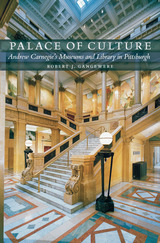
Andrew Carnegie is remembered as one of the world’s great philanthropists. As a boy, he witnessed the benevolence of a businessman who lent his personal book collection to laborer’s apprentices. That early experience inspired Carnegie to create the “Free to the People” Carnegie Library in 1895 in Pittsburgh, Pennsylvania. In 1896, he founded the Carnegie Institute, which included a music hall, art museum, and science museum. Carnegie deeply believed that education and culture could lift up the common man and should not be the sole province of the wealthy. Today, his Pittsburgh cultural institution encompasses a library, music hall, natural history museum, art museum, science center, the Andy Warhol Museum, and the Carnegie International art exhibition.
In Palace of Culture, Robert J. Gangewere presents the first history of a cultural conglomeration that has served millions of people since its inception and inspired the likes of August Wilson, Andy Warhol, and David McCullough. In this fascinating account, Gangewere details the political turmoil, budgetary constraints, and cultural tides that have influenced the caretakers and the collections along the way. He profiles the many benefactors, trustees, directors, and administrators who have stewarded the collections through the years. Gangewere provides individual histories of the library, music hall, museums, and science center, and describes the importance of each as an educational and research facility.
Moreover, Palace of Culture documents the importance of cultural institutions to the citizens of large metropolitan areas. The Carnegie Library and Institute have inspired the creation of similar organizations in the United States and serve as models for museum systems throughout the world.
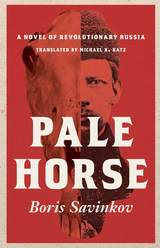
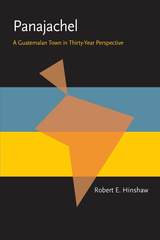
Building on Sol Tax's pioneering work of the economic organization of Panajachel in the 1930s, Hinshaw describes this Guatemalan village and analyzes the differences among Indians in other villages responding to environmental, social, and economic changes in the next quarter century. This book offers a unique examination of belief patterns and social relations, and the continuity and change in the society's worldview.
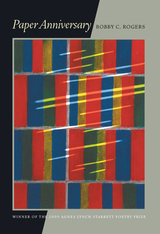
"There is something in American poetry that might be called the book of the small town or, equally, the tale of the good family; or, if you like, the American Grafitti Suite. Poems that discover life's bonuses in new love, wise parents, old books, venerable nature, and the mysteries of all that endures in the face of the viciousness no life escapes--are, well, worth the wait. That’s how I feel about Paper Anniversary. His poems are full of the best news, the kind the soul, as W. C. Williams attested, can get nowhere better than in the life of the lively mind. I think any reader will find this an auspicious, welcome arrival."
--Dave Smith
"In his superb Paper Anniversary, Bobby Rogers is a near mystic of the domestic because love of family and landscape is connected to the eternal--and if not the eternal, our longing for love to last. Rogers is a meditative poet, then, one who knows language and memory are inadequate to hold love in an abiding present: 'But ownership is the last lie/we tell ourselves--nothing goes unshared.' So his moving, widely thoughtful, and commodious poems are full of joy tinged with elegy."
--Andrew Hudgins
Bobby C. Rogers is professor of English at Union University in Jackson, Tennessee. His poems have appeared in the Southern Review, the Georgia Review, Image, Shenandoah, Puerto del Sol, and numerous other magazines. He is the recipient of the Greensboro Review Literary Prize in Poetry and has twice been nominated for a Pushcart Prize.










Hailed as “the most important congressman in the House of Representatives during the Civil War” and still honored in Pennsylvania as the father of its public school system, Thaddeus Stevens grappled in his day with many of the issues that confront us today: racial and economic equality, affirmative action, and equal access to education.
Volume one of the projected two-volume edition of The Papers of Thaddeus Stevens covers Steven’s political career from his Vermont youth to the end of the Civil War. It includes letters and speeches from his early days as a Gettysburg lawyer and as a representative in the Pennsylvania assembly through his antislavery efforts to the 1865 passage of the Thirteenth Amendment, freeing all slaves.

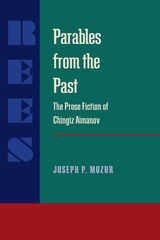
Chingiz Aitmatov was born in Kirghizstan in 1928 and published his first stories in the 1950s in both Russian and Kirghiz. He soon took his place as spokesman for the progressive wing of official Soviet Russian literature, striving for greater openness in Soviet letters and for a new approach toward diverse nationalities. Unlike many other writers, Aitmatov continued to flourish in the cultural tumult following the collapse of the communist state, being appointed to government posts by Gorbachev and becoming Soviet ambassador to Luxembourg in 1991.


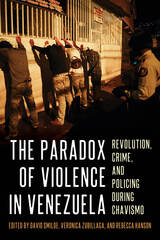
Crime and violence soared in twenty-first-century Venezuela even as poverty and inequality decreased, contradicting the conventional wisdom that these are the underlying causes of violence. The Paradox of Violence in Venezuela explains the rise of violence under both Hugo Chávez and Nicolás Maduro—leftist presidents who made considerable investment in social programs and political inclusion. Contributors argue that violence arose not from the frustration of inequality, or the needs created by poverty, but rather from the interrelated factors of a particular type of revolutionary governance, extraordinary oil revenues, a reliance on militarized policing, and the persistence of concentrated disadvantage. These factors led to dramatic but unequal economic growth, massive institutional and social change, and dysfunctional criminal justice policies that destabilized illicit markets and social networks, leading to an increase in violent conflict resolution. The Paradox of Violence in Venezuela reorients thinking about violence and its relationship to poverty, inequality, and the state.

This book assesses how and to what extent the governments of Cardinal Mazarin and Louis XIV controlled the Parlement of Paris in the two decades after the civil wars known as the Fronde. The history of this prestigious court of law bears directly on the broader issue of the growth of “royal absolutism.” Few historians have examined the resurgence of royal authority after the Fronde from the vantage point of traditional institutions, and no other scholarly work deals extensively with the activities of Parlement during this controversial period. This study reveals the methods, achievements, and limitations of absolutism associated with the Sun King.
The book investigates the impact of royal policies on the way the judges acquired and transmitted their posts, the sources of their wealth, the social composition of their court, and their judicial and administrative authority. Parlement's political activities and its conflicts with the crown over issues of judicial, financial, and religious importance also receive thorough treatment.
The author's extensive archival research indicates that many widely held assumptions about declining importance of Parlement after the civil war are unwarranted. Although Parlement's political activities gradually declined, this transformation was neither as complete nor as irreversible as historians have asserted. Parlement retained some voice in affairs of state, and most of the administrative machinery it could employ to oppose royal policy remained intact. Moreover, the crown failed to attack the sources of parlementaire wealth, and the judges freely enhanced their court's status as a social corporation.
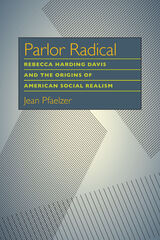
By engaging current strategies in literary hermeneutics with a strong sense of historical radicalism in the Gilded Age, Jean Pfaelzer reads Davis through the public issues that she forcefully inscribed in her fiction. In this study, Davis's realistic narratives actively construct a coherent social work, not in a fictional vacuum but in direct engagement with the explosive movements of social change from the Civil War through the turn of the century.
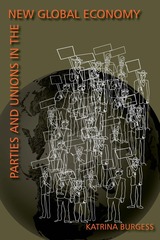
For much of the twentieth century, unions played a vital role in shaping political regimes and economic development strategies, particularly in Latin America and Europe. However, their influence has waned as political parties with close ties to unions have adopted neoliberal reforms harmful to the interests of workers.
What do unions do when confronted with this “loyalty dilemma”? Katrina Burgess compares events in three countries to determine the reasons for widely divergent responses on the part of labor leaders to remarkably similar challenges. She argues that the key to understanding why some labor leaders protest and some acquiesce lies essentially in two domains: the relative power of the party and the workers to punish them, and the party's capacity to act autonomously from its own government.
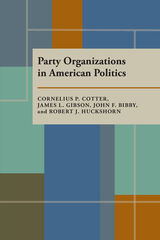
Contradicting the conventional political wisdom of the 1970s, which said state political parties were dormant and verging upon extinction, this book reveals that state party organizations actually grew stronger in the 1960s and 1970s.
Reprinted with a new preface that covers changes in the 1980s in electoral politics, Party Organizations in American Politics encourages a reappraisal of scholarly treatment of party organization in political science.

In Pastoral and Monumental, Donald C. Jackson chronicles America’s longtime fascination with dams as represented on picture postcards from the late nineteenth to the mid-twentieth century. Through over four hundred images, Jackson documents the remarkable transformation of dams and their significance to the environment and culture of America.
Initially, dams were portrayed in pastoral settings on postcards that might jokingly proclaim them as “a dam pretty place.” But scenes of flood damage, dam collapses, and other disasters also captured people’s attention. Later, images of New Deal projects, such as the Hoover Dam, Grand Coulee Dam, and Norris Dam, symbolized America’s rise from the Great Depression through monumental public works and technological innovation. Jackson relates the practical applications of dams, describing their use in irrigation, navigation, flood control, hydroelectric power, milling, mining, and manufacturing. He chronicles changing construction techniques, from small timber mill dams to those more massive and more critical to a society dependent on instant access to electricity and potable water.
Concurrent to the evolution of dam technology, Jackson recounts the rise of a postcard culture that was fueled by advances in printing, photography, lowered postal rates, and America’s fascination with visual imagery. In 1910, almost one billion postcards were mailed through the U.S. Postal Service, and for a period of over fifty years, postcards featuring dams were “all the rage.” Whether displaying the charms of an old mill, the aftermath of a devastating flood, or the construction of a colossal gravity dam, these postcards were a testament to how people perceived dams as structures of both beauty and technological power.
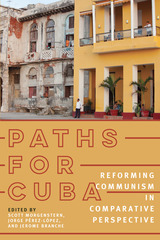
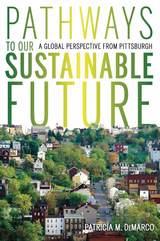
Pittsburgh has a rich history of social consciousness in calls for justice and equity. Today, the movement for more sustainable practices is rising in Pittsburgh. Against a backdrop of Marcellus shale gas development, initiatives emerge for a sustainable and resilient response to the climate change and pollution challenges of the twenty-first century. People, institutions, communities and corporations in Pittsburgh are leading the way to a more sustainable future.
Examining the experience of a single city, with all of its social and political complexities and long industrial history, allows a deeper understanding of the challenges and opportunities inherent in adapting to a changing world. Choices for more sustainable pathways for the future include transforming the energy system, restoring infertile ground, and preventing pollution through green chemistry production. Throughout the book, case studies responding to ethical challenges give specific examples of successful ways forward. Inspired by Rachel Carson’s voice of precaution in protecting the Earth, this is a book about empowerment and hope.

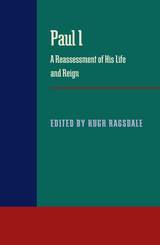
This book offers the first book-length English language biography of Russian emperor Paul I (1754–1801), since a 1913 translation. Most of the essays have been written expressly for this volume. They examine Paul’s education, his mental pathology, his administrative aims, curious relations with the knights of Malta and with Bonaparte, and his struggles with the threatening ideas emanating from the French Revolution. There is also a provocative new view of the conspiracy that took Paul’s life.

Peach State has its origins in Atlanta, Georgia, the author’s hometown and an emblematic city of the New South, a name that reflects the American region’s invigoration in recent decades by immigration and a spirit of reinvention. Focused mainly on food and cooking, these poems explore the city’s transformation from the mid-twentieth century to today, as seen and shaped by Chinese Americans. The poems are set in restaurants, home kitchens, grocery stores, and the houses of friends and neighbors. Often employing forms—sonnet, villanelle, sestina, palindrome, ghazal, rhymed stanzas—they also mirror the constant negotiation with tradition that marks both immigrant and Southern experience.
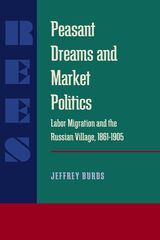
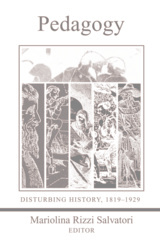
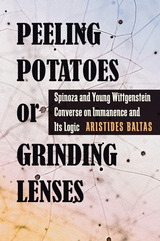
“I can work best now while peeling potatoes. . . . It is for me what lens-grinding was for Spinoza.”—L. Wittgenstein
More than 250 years separate the publication of Baruch Spinoza’s Ethics and Ludwig Wittgenstein’s Tractatus Logico-Philosophicus. Both are considered monumental philosophical treatises, produced during markedly different times in human history, and notoriously challenging to interpret. In Peeling Potatoes or Grinding Lenses, Aristides Baltas contends that these works bear a striking similarity based on the idea of “radical immanence.” Each purports to understand the world, thought, and language from the inside and in a way leading to the dissolution of all philosophy. In that guise, both offer a powerful argument against fundamentalism of all sorts and kinds.
To Spinoza, God is just Nature. God is not above or separate from the world, humanity, or mere objects for, as Nature, He inheres in everything. To Wittgenstein, logic is not above or separate from language, thought, and the world. The hardness of the logical “must” inheres in states of affairs, facts, thoughts, and linguistic acts. Outside there are no truths or sense—only nonsense.
Through close readings of the texts based on lessons drawn from radical paradigm change in science, Baltas finds in both works a single-minded purpose, implacable reasoning, and an austerity of style that are rare in the history of philosophy. He analyzes the structure and content of each treatise, the authors’ intentions, the limitations and possibilities afforded by scientific discovery in their respective eras, their radical opposition to prevailing philosophical views, and draws out the particulars, as well as the implications, of the arresting match between the two.
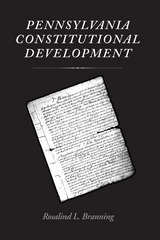
Pennsylvania Constitutional Development has proven to be the definitive study of the history of Pennsylvania's constitution in its first four incarnations. Rosalind Branning's critique, first published in 1960, reflects the movement that led to the constitution of 1968. After tracing the history of the 1776 constitution and its earliest revisions--in 1790 and 1838--Branning primarily focuses on the constitutional convention of 1872-73 and the resulting document of 1874, which endured for almost a century. She uses the published <I>Debates</I>, newspaper files, and the observations of contemporary writers and statesmen to provide a detailed and engaging study of the politics and leadership of the time. Her analysis demonstrates that this constitutional convention produced an instrument that was designed to meet nineteenth-century needs but would need significant revisions by future generations. Foreseeing the very issues that would be addressed in the 1967-68 constitutional convention, Branning identifies the elements that are necessary for successful constitutional lawmaking.
The evolution of Pennsylvania's body of laws serves as a cogent example of the opportunities and foibles intrinsic to the process of defining effective governance of a state. Pennsylvania Constitutional Development remains an essential resource for students and historians, and should be read by anyone interested in the government of the Keystone State.
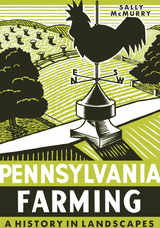
Since precolonial times, agriculture has been deeply woven into the fabric of Pennsylvania’s history and culture. Pennsylvania Farming presents the first history of Pennsylvania agriculture in than more sixty years and offers a completely new perspective. Sally McMurry goes beyond a strictly economic approach and considers the diverse forces that helped shape the farming landscape, from physical factors to cultural repertoires to labor systems. Above all, the people who created and worked on Pennsylvania’s farms are placed at the center of attention. More than 150 photographs inform the interpretation, which offers a sweeping look at the evolution of Pennsylvania’s agricultural landscapes right up to the present day.


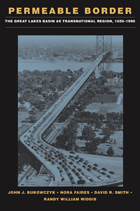
From the colonial era of waterborne transport, through nineteenth-century changes in transportation and communication, to globalization, the history of the Great Lakes Basin has been shaped by the people, goods, and capital crossing and recrossing the U.S.-Canadian border.
During the past three centuries, the region has been buffeted by efforts to benefit from or defeat economic and political integration and by the politics of imposing, tightening, or relaxing the bisecting international border. Where tariff policy was used in the early national period to open the border for agricultural goods, growing protectionism in both countries transformed the border into a bulwark against foreign competition after the 1860s. In the twentieth century, labor migration followed by multinational corporations fundamentally altered the customary pairing of capital and nation to that of capital versus nation, challenging the concept of international borders as key factors in national development.
In tracing the economic development of the Great Lakes Basin as borderland and as transnational region, the authors of Permeable Border have provided a regional history that transcends national borders and makes vital connections between two national histories that are too often studied as wholly separate.

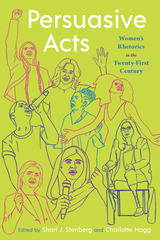
Persuasive Acts: Women’s Rhetorics in the Twenty-First Century gathers an expansive array of voices and texts from well-known figures including Hillary Rodham Clinton, Malala Yousafzai, Michelle Obama, Lindy West, Sonia Sotomayor, and Chimamanda Ngozi Adichie, so that readers may converse with them, and build rhetorics of their own. Editors Shari J. Stenberg and Charlotte Hogg have complied timely and provocative rhetorics that represent critical issues and rhetorical affordances of the twenty-first century.


Winner of the 1988 Policy Studies Organization Book Award
Among the more dramatic changes brought by World War II was the widespread introduction of new synthetic chemical pesticides - products welcomed as technological answers to a whole host of agricultural problems. The dangers posed by these products were often ignored in the rush to get them onto the market. Federal policy primarily reflected the interests of those promoting the new technologies. The risks associated with pesticides, as yet ill-understood, continued to be played down during the 1950s, despite their sudden emergence as a public problem as a result of health scares and fish and wildlife deaths following massive pest eradication campaigns. These events, together with the publication of Rachel Carson’s Silent Spring, spawned the environmental movement of the 1960s.
Dramatic changes came in the early 1970s as environmental values permeated the institutions and dynamics of American politics. Such changes produced new priorities, and - in part - a redirection in federal policy on chemical pesticides. The National Environmental Policy Act, the creation of the Environmental Protection Agency, congressional reforms, and broad popular support opened opportunities for those seeking to alter pesticides policy. But by the mid-1980s, after more than a decade of conflict, that policy is in limbo, caught between powerful environmental, economic, and political forces.
How did this happen?
Pesticides and Politics traces the long battle over control of pesticides through an analytical framework that is at the same time historical, comparative, and theoretical. Christopher J. Bosso’s account analyzes the responses to this complex problem by commercial interests, government, the media, and the public, and shows how the issue evolved over forty years of technological and political change.
Bosso’s research leads to a number of insights about the U.S. structure of governance. It shows how the system itself determines who gains access to decision making and who is excluded, and how conflicts are redefined as the range of interests attached to them grows. Bosso concludes that for fundamental institutional reasons, as well as political ones, federal pesticides policy lies stalled and impotent in the mid-1980s.
Relying heavily on government documents, the sizable literature on environmental politics, and interviews with relevant policy actors, Pesticides and Politics will enlighten students of the public policy process, and also be useful in courses in policy making and policy analysis.

Among his many topics, Rescher discusses knowledge and the unattainablity of absolutes, skepticism and its self-defeating nature, the limits of science vs. the limits of cognition, refuting reality as mind-independent, and idealism and divining our role in nature. He considers the universe and intelligence as the product of intelligent design, science and religion as non-conflicting and purposeful pursuits, and determinism and other fallacies surrounding the concept of free will. Rescher views morality in its hierarchal structure, its applicability to human coexistence, and its ontological commitment to the enhancement of value for ourselves and our world. He examines questions of authority and the problem of judging past actions or knowledge by present standards. Overall, he argues for philosophy as an unavoidable tool for rational, cogent responses to large questions.

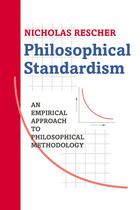
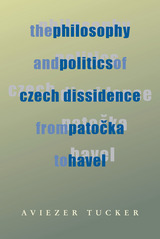
A critical study of the philosophy and political practice of the Czech dissident movement Charter 77. Aviezer Tucker examines how the political philosophy of Jan Patocka (1907–1977), founder of Charter 77, influenced the thinking and political leadership of Vaclav Havel as dissident and president.
Presents the first serious treatment of Havel as philosopher and Patocka as a political thinker. Through the Charter 77 dissident movement in Czechoslovakia, opponents of communism based their civil struggle for human rights on philosophic foundations, and members of the Charter 77 later led the Velvet Revolution. After Patocka’s self-sacrifice in 1977, Vaclav Havel emerged a strong philosophical and political force, and he continued to apply Patocka’s philosophy in order to understand the human condition under late communism and the meaning of dissidence. However, the political/philosophical orientation of the Charter 77 movement failed to provide President Havel with an adequate basis for comprehending and responding to the extraordinary political and economic problems of the postcommunist period.
In his discussion of Havel's presidency and the eventual corruption of the Velvet Revolution, Tucker demonstrates that the weaknesses in Charter 77 member's understanding of modernity, which did not matter while they were dissidents, seriously harmed their ability to function in a modern democratic system. Within this context, Tucker also examines Havel’s recent attempt to topple the democratic but corrupt government in 1997–1998. The Philosophy and Politics of Czech Dissidence from Patocka to Havel will be of interest to students of philosophy and politics, scholars and students of Slavic studies, and historians, as well as anyone fascinated by the nature of dissidence.
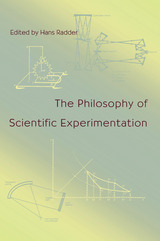
Since the late 1980s, the neglect of experiment by philosophers and historians of science has been replaced by a keen interest in the subject. In this volume, a number of prominent philosophers of experiment directly address basic theoretical questions, develop existing philosophical accounts, and offer novel perspectives on the subject, rather than rely exclusively on historical cases of experimental practice.
Each essay examines one or more of six interconnected themes that run throughout the collection: the philosophical implications of actively and intentionally interfering with the material world while conducting experiments; issues of interpretation regarding causality; the link between science and technology; the role of theory in experimentation involving material and causal intervention; the impact of modeling and computer simulation on experimentation; and the philosophical implications of the design, operation, and use of scientific instruments.

Winner of the 2010 Drue Heinz Literature Prize
The Physics of Imaginary Objects, in fifteen stories and a novella, offers a very different kind of short fiction, blending story with verse to evoke fantasy, allegory, metaphor, love, body, mind, and nearly every sensory perception. Weaving in and out of the space that connects life and death in mysterious ways, these texts use carefully honed language that suggests a newfound spirituality.
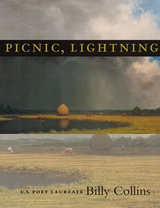
Over the past decade, Billy Collins has emerged as the most beloved American poet since Robert Frost, garnering critical acclaim and broad popular appeal. Annie Proulx admits, "I have never before felt possessive about a poet, but I am fiercely glad that Billy Collins is ours." John Updike proclaims his poems "consistently startling, more serious than they seem, they describe all the worlds that are and were and some others besides."
This special, limited edition celebrates Billy Collins's years as U.S. Poet Laureate. Picnic, Lightning--one of the books that helped establish and secure his reputation and popularity during the 1990s--combines humor and seriousness, wit and sublimity. His poems touch on a wide range of subjects, from jazz to death, from weather to sex, but share common ground where the mind and heart can meet. Whether reading him for the first time or the fiftieth, this collector's edition is a must-have for anyone interested in the poet the New York Times calls simply "the real thing."
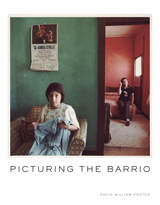
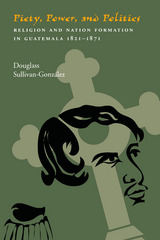
Douglass Sullivan Gonzalez examines the influence of religion on the development of nationalism in Guatemala during the period 1821-1871, focusing on the relationship between Rafael Carrera amd the Guatemalan Catholic Church. He illustrates the peculiar and fascinating blend of religious fervor, popular power, and caudillo politics that inspired a multiethnic and multiclass alliance to defend the Guatemalan nation in the mid-nineteenth century.
Led by the military strongman Rafael Carrera, an unlikely coalition of mestizos, Indians, and creoles (whites born in the Americas) overcame a devastating civil war in the late 1840s and withstood two threats (1851 and 1863) from neighboring Honduras and El Salvador that aimed at reintegrating conservative Guatemala into a liberal federation of Central American nations.
Sullivan-Gonzalez shows that religious discourse and ritual were crucial to the successful construction and defense of independent Guatemala. Sermons commemorating independence from Spain developed a covenantal theology that affirmed divine protection if the Guatemalan people embraced Catholicism. Sullivan-Gonzalez examines the extent to which this religious and nationalist discourse was popularly appropriated.
Recently opened archives of the Guatemalan Catholic Church revealed that the largely mestizo population of the central and eastern highlands responded favorably to the church’s message. Records indicate that Carrera depended upon the clerics’ ability to pacify the rebellious inhabitants during Guatemala’s civil war (1847-1851) and to rally them to Guatemala’s defense against foreign invaders. Though hostile to whites and mestizos, the majority indigenous population of the western highlands identified with Carrera as their liberator. Their admiration for and loyalty to Carrera allowed them a territory that far exceeded their own social space.
Though populist and antidemocratic, the historic legacy of the Carrera years is the Guatemalan nation. Sullivan-Gonzalez details how theological discourse, popular claims emerging from mestizo and Indian communities, and the caudillo’s ability to finesse his enemies enabled Carrera to bring together divergent and contradictory interests to bind many nations into one.

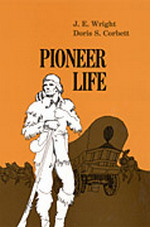
Pioneer Life in Western Pennsylvania was one of the original books sponsored by the University of Pittsburgh, the Historical Society of Western Pennsylvania, and the Buhl Foundation to mark the founding of the University of Pittsburgh Press. Authors Wright and Corbett describe the country the first settlers discovered, the homes and towns they built, the farm implements and household goods they used, the crops they grew and how their small, isolated communities laid the foundations for the cities and industries we know today
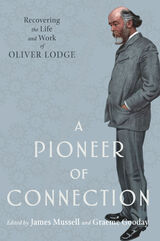

Whether winning world championships or falling into last place, fielding teams with Hall of Fame players or trotting out bumbling boys of summer, the Pittsburgh Pirates have thrilled, frustrated, and fascinated generations of fans since 1876.
To date, the Pirates have won five World Series and have a total of thirty-six players and managers in the Hall of Fame-including Honus Wagner, Pie Traynor, Lloyd and Paul Waner, Ralph Kiner, Willie Stargell, Roberto Clemente, and Bill Mazeroski.
The Pirates Reader is a tribute to the fans, players, and teams who have forged the franchise's rich history. Richard Peterson has collected the writing of baseball's greatest storytellers and brings to life the players, games, and magical moments for this classic and well-loved team.

Focusing on a class action lawsuit against the Illinois child welfare system (B. H. v. Johnson), Pitiful Plaintiffs examines the role of the federal courts in the child welfare policymaking process and the extent to which litigation can achieve the goal of reforming child welfare systems.
Beginning in the 1970s, children’s advocates asked the federal courts to intervene in the child welfare policymaking process. Their weapons were, for the most part, class action suits that sought widespread reform of child welfare systems. This book is about the tens of thousands of abused and neglected children in the United States who enlisted the help of the federal courts to compel state and local governments to fulfill their obligations to them. Based on a variety of sources, the core of the research consists of in-depth, open-ended interviews with individuals involved in the Illinois child welfare system, particularly those engaged in the litigation process, including attorneys, public officials, members of children’s advocacy groups, and federal court judges. The interviews were supplemented with information from legal documents, government reports and publications, national and local news reports, and scholarly writings. Despite the proliferation of child welfare lawsuits and the increasingly important role of the federal judiciary in child welfare policymaking, structural reform litigation against child welfare systems has received scant scholarly attention from a political science or public policy perspective. Mezey’s comprehensive study will be of interest to political scientists and public policy analysts, as well as anyone involved in social justice and child welfare.
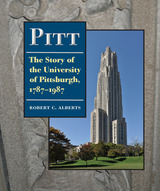
The story begins in the early spring of 1781, when an ambitious young Philadelphia lawyer named Hugh Henry Brackenridge crossed the Alleghenies to seek his opportunity in Pittsburgh. “My object,”?he wrote, “was to advance the country [Western Pennsylvania] and thereby myself.” He founded Pittsburgh Academy, later to be the Western University of Pennsylvania and then the University of Pittsburgh, and lived to see the school grow along with the city.
Author Robert C. Alberts, mines the University archives and describes many issues for the first time. Among them is the role played by the Board of Trustees in the conflicts of the administration of Chancellor John Gabbert Bowman, including the firing of a controversial history professor, Ralph Turner; the resignation of the legendary football coach, Jock Sutherland; and a Board investigation into Bowman’s handling of faculty and staff. We see Pitt’s decade of progress under Edward Litchfield (1956–165), who gambled that the millions of dollars he spent . . . would be forthcoming form somewhere or someone; but who, as it turned out was mistaken.”
Pitt became a state-related university in August 1966, but financial stability was achieved gradually during the administration of Chancellor Wesley W. Posvar. The ensuing crisis of the 1960s and early 1970, caused by the Vietnam War, and the student protests that accompanied it, are described in rich detail. The history then follows Pitt’s emergence as a force in international higher education; the institution’s role in fostering a cooperative relationship with business; and its entry into the postindustrial age of high technology.
The story of Pitt reflects all the struggles and the hopes of the region. As Alberts writes in his preface, “There was drama; there was tragedy; there was indeed controversy and politics. There were, unexpectedly, rich veins of humor, occasionally of comedy.”
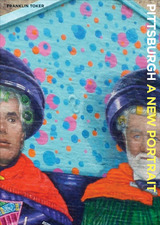
Toker highlights this remarkable story of urban reinvention by focusing on what makes Pittsburgh so resilient and appealing - its strong neighborhoods and their surprisingly rich architectural history. The many unique, lively urban communities that make up Pittsburgh are a treasure trove of every imaginable style of structure, from Victorian to Bauhaus, Gothic to Art Deco, and from Industrial to Green. These ordinary homes expressed the aspirations of people who came from around the world to settle in Pittsburgh, while they built the city itself into an economic powerhouse. With the wealth generated by this everyday work, local captains of industry could build their own monumental additions to Pittsburgh's urban landscape, including two of America's greatest buildings: H. H. Richardson's Allegheny Courthouse and Frank Lloyd Wright's Fallingwater.
With accessible prose, Toker examines Pittsburgh in its historical context (from Indian settlement to postmodern city), in its regional setting (from the playgrounds of the Laurel Highlands to the hard-working mill towns dotting the landscape), and from the street level (leading the reader on a personal tour through every neighborhood). Lavishly illustrated with photos and maps, Pittsburgh: A New Portrait reveals the true colors of a truly great American city.
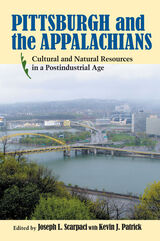
Few American cities reflect the challenges and promise of a twenty-first-century economy better than Pittsburgh and its surrounding region. Once a titan of the industrial age, Pittsburgh flourished from the benefits of its waterways, central location, and natural resources-bituminous coal to fire steel furnaces; salt and sand for glass making; gas, oil, and just enough ore to spark an early iron industry. Today, like many cities located in the manufacturing triangle that stretches from Boston to Duluth to St. Louis, Pittsburgh has made the transition to a service-based economy.
Pittsburgh and the Appalachians presents a collection of eighteen essays that explore the advantages and disadvantages that Pittsburgh and its surrounding region face in the new global economy, from the perspectives of technology, natural resources, workforce, and geography. It offers an extensive examination of the processes and factors that have transformed much of industrial America during the past half-century, and shows how other cities can learn from the steps Pittsburgh has taken through redevelopment, green space acquisition, air and water quality improvement, cultural revival, and public-private partnerships to create a more livable, economically viable region for future populations.

Pittsburgh has a rich and diverse theatrical tradition, from early frontier performances by officers stationed at Fort Pitt through experimental theater at the end of the twentieth century. Pittsburgh in Stages offers the first comprehensive history of theater in Pittsburgh, placing it within the context of cultural development in the city and the history of theater nationally.
By the time the first permanent theater was built in 1812, Pittsburgh had already established itself as a serious patron of the theatrical arts. The city soon hosted New York and London-based traveling companies, and gained a national reputation as a proving ground for touring productions. By the early twentieth century, numerous theaters hosted 'popular-priced' productions of vaudeville and burlesque, and theater was brought to the masses. Soon after, Pittsburgh witnessed the emergence of myriad community-based theater groups and the formation of the Federation of Non-Commercial Theatres and the New Theater League, guilds designed to share resources among community producers. The rise of local theater was also instrumental to the growth of African American theatrical groups. Though victims of segregation, their art flourished, and was only later recognized and blended into Pittsburgh's theatrical melting pot.
Pittsburgh in Stages relates the significant influence and interpretation of urban socioeconomic trends in the theatrical arts and the role of the theater as an agent of social change. Dividing Pittsburgh's theatrical history into distinct eras, Lynne Conner details the defining movements of each and analyzes how public tastes evolved over time. She offers a fascinating study of regional theatrical development and underscores the substantial contribution of regional theater in the history of American theatrical arts.

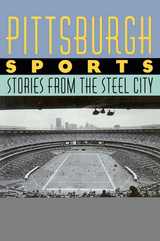
Summer afternoons at Forbes Field, playoff Sundays with the Steelers, winter nights at the Igloo cheering for Mario and the Penguins: Pittsburgh Sports captures all that and more. With stories from sports fans, historians, and former athletes, Pittsburgh Sports mixes personal experiences with team histories to capture the full range of what it means to be a sports fan—in Pittsburgh, or, by extension, anywhere.
A book that can be read cover-to-cover, or in bits and pieces, Pittsburgh Sports includes chapters on the ill-fated Pittsburgh Pipers, who won the American Basketball Association’s first championship, then folded four years later; the Pittsburgh Crawfords and the Homestead Grays, perennial Negro League powerhouses; Johnny Unitas, Joe Namath, Jim Kelly, Joe Montana, Dan Marino, and other legends of western Pennsylvania high school football; boxing’s illustrious past in the Iron City; football reminiscences by a former Steelers punter; and the ups and downs of the Pittsburgh Pirates.

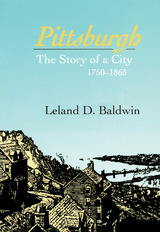
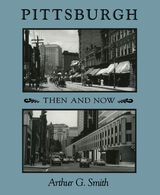
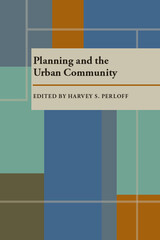
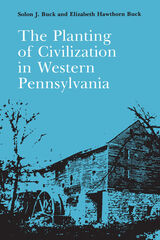
Among the more than one hundred illustrations are contemporary pictures, maps, plans of forts, portraits, architectural photographs and more.
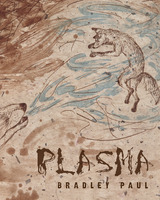
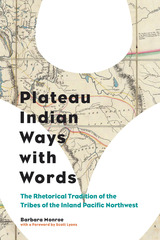
Anecdotal evidence, often dramatically recreated; sarcasm and humor; suspended or unstated thesis; suspenseful arrangement; intimacy with and respect for one’s audience as co-authors of meaning—these are among the privileged markers in this particular indigenous rhetorical tradition. Such strategies of personalization, as Monroe terms them, run exactly counter to Euro-American academic standards that value secondary, distant sources; “objective” evidence; explicit theses; “logical” arrangement. Not surprisingly, scores for Native students on mandated tests are among the lowest in the nation.
While Monroe questions the construction of this so-called achievement gap on multiple levels, she argues that educators serving Native students need to seek out points of cultural congruence, selecting assignments and assessments where culturally marked norms converge, rather than collide. New media have opened up many possibilities for this kind of communicative inclusivity. But seizing such opportunities is predicated on educators, first, recognizing Plateau Indian students’ distinctive rhetoric, and then honoring their sovereign right to use it. This book provides that first step.

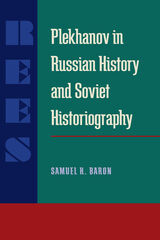

Winner of the 2008 Paterson Award for Literary Excellence
"Weaver has crafted a virtual planet in this book with plenty of alternate geographies for readers of all flavors and stripes. Marvelous. Huge. Prodigious.”
—North American Review
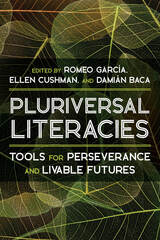
A Global Analysis of Sites, Practices, and Processes of Decolonial and Indigenous Meaning-Making
Decolonial projects can end up reinforcing dominant modes of thinking by shoehorning understandings of Indigenous and non-Western traditions within Eurocentric frameworks. The pluralization of literacies and the creation of so-called alternative rhetorics accepts that there is a totalizing reality of rhetoric and literacy. This volume seeks to decenter these theories and to engage Indigenous contexts on their own terms, starting with the very tools of representation. Language itself can disrupt normative structures and create pluriversal possibilities. The volume editors and contributors argue for epistemic change at the level of the language and media that people use to represent meaning. The range of topics covered includes American Indian and Indigenous representations, literacies, and rhetorics; critical revisionist historiography and comparative rhetorics; delinking colonial literacies of cartographic power and modernity; “northern” and “southern” hemispheric relations; and theorizations of/from oceanic border spaces.

Eight years before Sylvia Plath published Ariel, the Uruguayan poet Idea Vilariño released Poemas del Amor, a collection of confessional, passionate poetry dedicated to the novelist Juan Carlos Onetti. Both of her own merit and as part of the Uruguayan writers group the Generation of ’45—which included Onetti, Mario Benedetti, Amanda Berenguer, and Ida Vitale—Vilariño is an essential South American poet, and part of a long tradition of Uruguayan women poets.
Vilariño and Onetti’s love affair is one of the most famous in South American literature. Poemas del Amor is an intense book, full of poems about sexuality and what it means to be a woman, and stands as a testament to both the necessity and the impossibility of love. This translation brings these highly personal poems to English speaking audiences for the first time side-by-side with the original Spanish language versions.
THE WITNESS
I don’t ask you for anything
don’t accept anything from you.
It’s enough that you are
in the world
that you know I am
in the world
that you might be
To me, you might be
witness judge and god.
If not
what is it for.

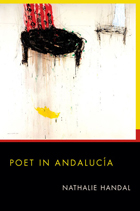
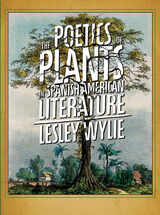

For six years of his brief like, Keats studied medicine, first as an apprentice in Edmonton and then as a medical student at Guy’s Hospital in London. His biographers have generally glossed over this period of his life, and critics have ignored it and denied the influence of medical training on his poetry and thought.
In this challenging reappraisal, Goellnicht argues that Keats’ writings reveal a distinct influence of science and medicine. Goellnicht researches Keats’ course work and texts to reconstruct the milieu of the early nineteenth-century medical student. He then explores the scientific resonances in Keats’’ individual works, and convincingly shows the influence of his early medical training.
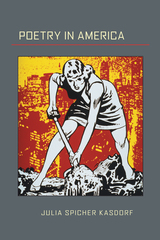
Poetry in America offers extravagantly formed lyric and narrative poems that function like works of social realism for our times: hard times, wartime, divorce, times of downturn and dissipated resources. Where, in such times, can poetry emerge, the book asks—and answers—again and again. Largely set in rural places and small towns, these poems are politically committed but deeply sensuous, emotionally complex and compassionate. They take up the everyday in meaningful ways, and deliver it with blunt force, yet not without hope or bright humor.
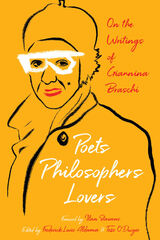

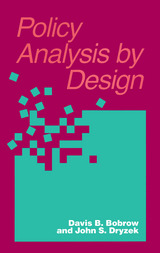
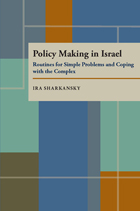
All governments face problems and are judged by their ability to solve them and the policies they develop in doing so. Compared with other Western democracies, Israel has faced a devastating number of problems of unusual severity in a relatively short time: war, terrorism, heavy immigration, unsettled boundaries, economic stresses, internal disputes about ethnicity and religion, and the lingering scars of the Holocaust and other persecutions. Sharkansky’s analysis of the Israeli government’s routines and methods for coping with such an array of difficulties, from simple to complex to intractable, offers general insights into how governments make policy in a democracy.
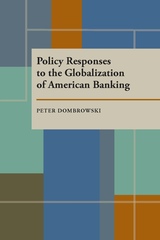
Since the late 1950s the world's banks have expanded their global operations, with US institutions leading the way. As the recent global economic crisis shows, actions of private bankers can threaten capital markets, weaken national regulatory systems, and strain international cooperation-seriously endangering the world economy and the interests of nation states.
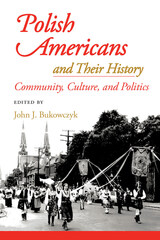
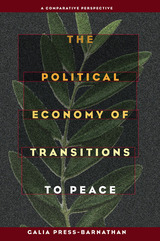
Much attention has focused on the ongoing role of economics in the prevention of armed conflict and the deterioration of relations. In The Political Economy of Transitions to Peace, Galia Press-Barnathan focuses on the importance of economics in initiating and sustaining peaceful relations after conflict.
Press-Barnathan provides in-depth case studies of several key relationships in the post-World War II era: Israel and Egypt; Israel and Jordan; Japan, the Philippines, and Indonesia; Japan and South Korea; Germany and France; and Germany and Poland. She creates an analytical framework through which to view each of these cases based on three factors: the domestic balance between winners and losers from transition to peace; the economic disparity between former enemies; and the impact of third parties on stimulating new cooperative economic initiatives. Her approach provides both a regional and cross-regional comparative analysis of the degree of success in maintaining and advancing peace, of the challenges faced by many nations in negotiating peace after conflict, and of the unique role of economic factors in this highly political process.
Press-Barnathan employs both liberal and realist theory to examine the motivations of these states and the societies they represent. She also weighs their power relations to see how these factor into economic interdependence and the peace process. She reveals the predominant role of the state and big business in the initial transition phase (“cold” peace), but also identifies an equally vital need for a subsequent broader societal coalition in the second, normalizing phase (“warm” peace). Both levels of engagement, Press-Barnathan argues, are essential to a durable peace. Finally, she points to the complex role that third parties can play in these transitions, and the limited long-term impact of direct economic side-payments to the parties.
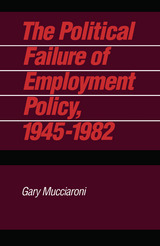
This political history analyzes the failure of the United States to adopt viable employment policies, follows U.S. manpower training and employment policy from the 1946 Employment Act to the Job Training Partnership Act of 1982. Between these two landmarks of legislation in the War on Poverty, were attempts to create public service employment (PSE), the abortive Humphrey-Hawkins Act, and the beleaguered Comprehensive Employment and Training Act (CETA).
Mucciaroni's traces the impact of economic ideas and opinions on federal employment policy. Efforts at reform, he believes, are frustrated by the tension between economic liberty and social equality that restricts the role of government and holds workers themselves accountable for success or failure. Professional economists, especially Keynesians, have shaped the content and timing of policy innovations in such ways as to limit employment programs to a social welfare mission, rather than broader, positive economic objectives. As a result, neither labor nor management has been centrally involved in making policy, and employment programs have lacked a stable and organized constituency committed to their success. Finally, because of the fragmentation of U.S. political institutions, employment programs are not integrated with economic policy, are hampered by conflicting objectives, and are difficult to carry out effectively.
As chronic unemployment and the United States' difficulties in the world marketplace continue to demand attention, the importance of Mucciaroni's subject will grow. For political scientists, economists, journalists, and activists, this book will be a rich resource in the ongoing debate about the deficiencies of liberalism and the best means of addressing one of the nation's most pressing social and political problems.
Mucciaroni's provocative theoretical analysis is buttressed by several years' research at the U.S. Department of Labor, access to congressional hearings, reports, and debates, and interviews with policy makers and their staffs. It will interest all concerned with the history of liberal social policy in the postwar period.
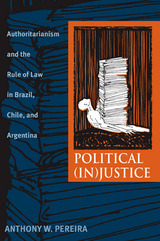

This collection of essays draws on writings from mythologists, sociologists, philosophers, historians, and political activists, to present perspectives on the techniques, philosophies, and theories of political leadership throughout history. The forty-three selections offer a broad range of thought and provide a uniquely comprehensive reference.

In these original essays, widely respected experts analyze the personal psychologies and public belief systems of the individuals and nations involved in the Gulf War - from George Bush and Saddam Hussein to the peoples of the United States, Israel, and Arab countries. Approaching the events of 1990-1991 from the perspectives of psychology, history, mass communications, and political science, these scholars examine the dynamic relationship of events, behavior, and perceptions.
Part I deals with the psychological and political origins of the war; part II focuses on George Bush, Saddam Hussein, and the nature of their leadership and judgement; part III discusses the battle for public perceptions and beliefs waged by both sides; part IV analyzes the results of that battle as revealed by the understanding of the U.S., Israeli, and Arab publics; and part V deals with the war’s consequences. A postscript by Stanley Renshon covers military actions in the Gulf in late 1992 and early 1993.
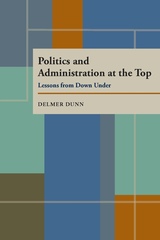
Winner of the 1998 Charles Levine Award for best book on administration and policy
Dunn focuses on two levers of power in modern democracies, the elected party politician and the professional state bureaucrat, using Australia as his example. Dunn uses interviews with Cabinet ministers, members of their staffs, and department heads of two governments in Australia to see how ministers seek to provide political direction to the bureaucracy. He examines the extent to which they succeed and how their direction is both influenced by and acted on by the departments.
Dunn's analysis provides a rare look at high-level relationships between politicians and executive departments in one democratic government and offers insights into issues of accountability and responsibility in democratic governments. His findings, based on his in-depth look at a government that blends many features of both U.S. and British governments, reveal the fundamentals that are necessary to make this key relationship work well and are thus pertinent to public administration in all democracies.
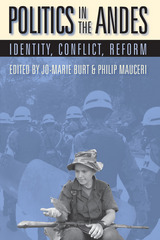
The Andean region is perhaps the most violent and politically unstable in the Western Hemisphere. Politics in the Andes is the first comprehensive volume to assess the persistent political challenges facing Bolivia, Colombia, Ecuador, Peru, and Venezuela.
Arguing that Andean states and societies have been shaped by common historical forces, the contributors' comparative approach reveals how different countries have responded variously to the challenges and opportunities presented by those forces. Individual chapters are structured around themes of ethnic, regional, and gender diversity; violence and drug trafficking; and political change and democracy.
Politics in the Andes offers a contemporary view of a region in crisis, providing the necessary context to link the often sensational news from the area to broader historical, political, economic, and social trends.
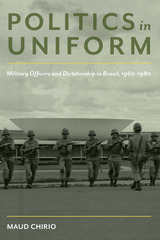
This book is a translation, with expanded material for English-language readers, of Maud Chirio's original Portuguese-language work, A política nos quartéis: Revoltas e protestos de oficiais na ditadura militar brasileira, which was awarded the Thomas E. Skidmore Prize by the Brazilian National Archives and Brazilian Studies Association.
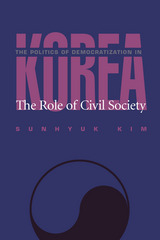
What role did civil society play in Korea's recent democratization? How does the Korean case compare with cases from other regions of the world? What is the current status of Korean democratic consolidation? What are the prospects for Korean democracy?
In December 1997, for the first time in the history of South Korea (hereafter Korea), an opposition candidate was elected to the presidency. Korea became the first new democracy in Asia where a horizontal transfer of power occurred through the electoral process. Sunhyuk Kim's study of democratization in Korea argues that the momentum for political change in Korea has consistently emanated from oppositional civil society rather than from the state. He develops a civil society paradigm and utilizes Korea’s three authoritarian breakdowns (only two of which resulted in democratic transitions) to illustrate the past and present influences of Korean civil society groups on authoritarian breakdowns, democratic transitions, and post-transition democratic consolidations.
One of the first systematic attempts to apply a civil society framework to a democratizing country in East Asia, The Politics of Democratization in Korea will be of use to political scientists and advanced undergraduate and graduate students working in comparative politics, political theory, East Asian politics, and the politics of democratization.
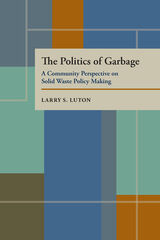

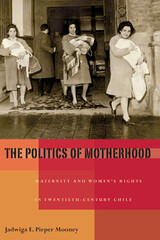
Chronicling an era of unprecedented modernization and political transformation, Jadwiga E. Pieper Mooney examines the negotiations over women's rights and the politics of gender in Chile throughout the twentieth century. Centering her study on motherhood, Pieper Mooney explores dramatic changes in health policy, population paradigms, and understandings of human rights, and reveals that motherhood is hardly a private matter defined only by individual women or couples. Instead, it is intimately tied to public policies and political competitions on nation-state and international levels.
The increased legitimacy of women's demands for rights, both locally and globally, has led to some improvements in gender equity. Yet feminists in contemporary Chile continue to face strong opposition from neoconservatism in the Catholic Church and a mixture of public apathy and legal wrangling over reproductive rights and health.
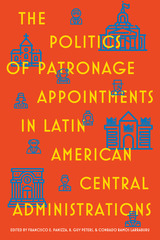
Although merit system selection and management of public personnel is thought of as the standard for good governance, public employees frequently are appointed by political officials rather than being members of a career civil service. In fact, there has been an increase in the level of patronage appointments and politicization of public administration over the past several decades as political leaders attempt to impose their control over the public bureaucracy. Although widespread, patronage appointments in the public sector are particularly important in Latin America, where there is a tradition of extensive patronage. The Politics of Patronage Appointments in Latin American Central Administrations seeks to understand the motivations of patrons when they make appointments, the roles appointees play, the skills required to play these roles, and what accounts for different modalities of patronage. It moves beyond the conventional condemnation of patronage to examine the multiple uses of political appointments, which can be crucial for obtaining the services of highly qualified individuals who otherwise might not be willing to work in the public sector.

In urban America, large-scale redevelopment is a frequent news item. Many proposals for such redevelopment are challenged—sometimes successfully, and other times to no avail. The Politics of Place considers the reasons for these outcomes by examining five cases of contentious redevelopment in Pittsburgh, Pennsylvania, between 1949 and 2000.
In four of these cases, the challengers to redevelopment failed to create the conditions necessary for strong democratic participation. In the fifth case—the proposed reconstruction of Pittsburgh’s downtown retail district (1997–2000)—challengers succeeded, and Crowley describes the crucial role of independent nonprofit organizations in bringing about this result.
At the heart of Crowley’s discussion are questions central to any urban redevelopment debate: Who participates in urban redevelopment, what motivates them to do so, and what structures in the political process open or close a democratic dialogue among the stakeholders? Through his astute analysis, Crowley answers these questions and posits a framework through which to view future contention in urban redevelopment.
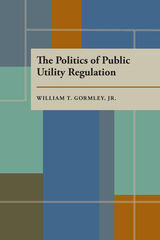
The Politics of Public Utility Regulation focuses on the important and increasingly controversial issues of utility regulation by combining a sophisticated understanding of these issues with a rigorous examination of various regulatory arrangements across the American states. It draws on interviews with participants in twelve states: public utility commissioners, commission staff members, utility company executives, governmental consumer advocates, and citizen activists. In addition to offering an up-to-date, comprehensive survey of regulatory politics at the state level, Gormley makes specific proposals for regulatory reform and emphasizes the importance (and difficulty) of assuring both expertise and accountability. Students of politics and public policy will find the state-level approach useful in examining the strategies of the “New Federalism” that transfer more and more formerly federal responsibilities to the states.
READERS
Browse our collection.
PUBLISHERS
See BiblioVault's publisher services.
STUDENT SERVICES
Files for college accessibility offices.
UChicago Accessibility Resources
home | accessibility | search | about | contact us
BiblioVault ® 2001 - 2024
The University of Chicago Press









